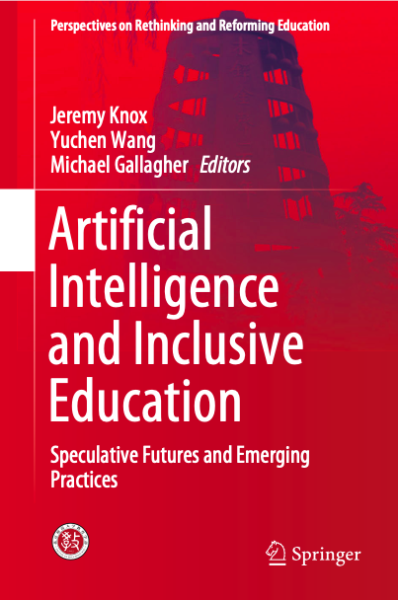Writing
 Knox, J. (2016). Posthumanism and the MOOC: Contaminating the Subject of Global Education. Abingdon: Routledge.
Knox, J. (2016). Posthumanism and the MOOC: Contaminating the Subject of Global Education. Abingdon: Routledge.
 Knox, J., Wang, Y. & Gallagher, M. (2019). Artificial Intelligence and Inclusive Education: speculative futures and emerging practices. Springer Nature.
Knox, J., Wang, Y. & Gallagher, M. (2019). Artificial Intelligence and Inclusive Education: speculative futures and emerging practices. Springer Nature.
Editing
Associate Editor Postdigital Science and Education with Springer
Editorial board: Teaching in Higher Education
A full and up to date list of publications can be found here
Journals
Knox, J. (2022). The Metaverse, or the serious business of tech frontiers. Postdigital Science and Education, 2 Mar 2022
Knox, J., Cui, X., Jin, Y. & Sun, B. (2022). Data, Artificial Intelligence, and the future of learning. The Chinese Journal of ICT in Education 28, 509, p. 5-12
Knox, J. (2021). How the ‘taming’ of private education in China is impacting AI. On Education, 12. Available: https://www.oneducation.net/no-12_december-2021/how-the-taming-of-private-education-in-china-is-impacting-ai/
Knox, J. (2021). Refocusing Zuboff’s ‘division of learning’ on Education. Seminar.net Special Issue: Digital Capitalism, Datafication, and Media Education: Critical Perspectives. 17(2). https://doi.org/10.7577/seminar.4268
Knox, J. (2021). Response to: “Disruptive Innovation and Technology Enhanced Learning”. In The Psychology of Education Review. 45, 1. https://shop.bps.org.uk/the-psychology-of-education-review-vol-45-no-1-spring-2021
Knox, J. (2020). Artificial Intelligence and Education in China. Special Issue of Learning, Media and Technology: Critical Approaches to Artificial Intelligence. https://doi.org/10.1080/17439884.2020.1754236 (2019 Impact Factor 2.547, 2139 views, 13 citations, 25 Altmetric)
Knox, J., Williamson, B. and Bayne, S. (2020). Machine Behaviourism: future visions of ‘learning’ across humans and machines. Special Issue of Learning Media and Technology: Education and technology into the 2020s: speculative futures. 45(1), pp. 31-45 (2019 Impact Factor 2.547, 1025 views, 3 citations, 48 Altmetric)
Knox, J. (2019). Postdigital as (re)turn to the political. Postdigital Science and Education. 1(2), pp. 1-33. (420 downloads, 1 citation, 2 Altmetric)
Knox, J. (2019). What Does the ‘Postdigital’ Mean for Education? Three Critical Perspectives on the Digital, with Implications for Educational Research and Practice, Postdigital Science and Education, Springer. https://link.springer.com/article/10.1007/s42438-019-00045-y 5702 downloads, 25 citations, 22 Altmetric
Knox, J. (2018). Beyond the ‘c’ and the ‘x’: learning with algorithms in the MOOC. International Review of Education. 64(2), pp. 161-178
Knox, J. (2017). How goes the revolution? Three themes in the shifting MOOC landscape. Educação e Tecnologia : Abordagens Criticas. Martins dos Santos Ferreira, G., Alexandre da Silva Rosado, L. & de Sá Carvalho, J. (eds.). 1 ed. Rio de Janeiro: Universidade Estacio De Sa, p. 386- 408.
Knox, J. (2017). De-colonising the MOOC: a critical view of the platform model for global education (Junhong Xiao trans.). Distance Education in China, 5. DOI:10.13541/j.cnki.chinade.20170420.001
Knox, J. (2017). Data Power in Education: exploring critical awareness with the ‘Learning Analytics Report Card’ (LARC). Special Issue: Data Power in Material Contexts, Journal of Television and Media.
Knox, J. (2016). Posthumanism and the MOOC: opening the subject of digital education. Studies in Philosophy and Education.
Knox, J. (2015) The ‘Tweeting Book’ and the question of ‘non-human data’ TechTrends, 59(1). pp.72-75
Knox, J. (2014). Active Algorithms: Sociomaterial Spaces in the E-learning and Digital Cultures MOOC. Campus Virtuales, University in the Cloud special issue, 3(1).
Knox, J. (2014). Digital Culture Clash: ‘massive’ education in the E-learning and Digital Cultures MOOC. Distance Education Special Issue on Massively Open Online Courses. DOI:10.1080/01587919.2014.917704 http://www.tandfonline.com/doi/abs/10.1080/01587919.2014.917704#.U6kowfldU1Y
Knox, J. & Bayne, S. (2014) Multimodal Profusion in the literacies of the Massive Open Online Course. Research in Learning Technology, Special Issue: Scholarship and Literacies in a Digital Age.
Knox, J. (2013) Five Critiques of the Open Educational Resources Movement. Teaching in Higher Education, 18(8). pp. 821-832. DOI:10.1080/13562517.2013.774354
Knox, J. (2013). The Limitations of Access Alone: moving towards open processes in education. Open Praxis. 5(1). pp. 21-29.
…co-authored
Ross, J., Sinclair, C., Knox, J., Bayne, S. and Macleod, H. (2014). Teacher experiences and academic identity: the missing components of MOOC pedagogy. Journal of Online Learning and Teaching (JOLT), MOOC special issue, 10(1). pp. 57-69.
Book Chapters
Knox, J. (forthcoming 2015) What’s the matter with MOOCs? Sociomaterial methodologies for educational research. In C. Hine, Y. Morey, S. Roberts, H. Watson (Eds.) Digital Methods as Mainstream Methodology: Inspirational Digital/Social Research. Basingstoke: Palgrave Macmillan
Knox, J., Ross, J., Sinclair, C., Macleod, H., Bayne, S. (2014) MOOC Feedback: pleasing all the people?. In S. Krause & C. Lowe Invasion of the MOOC. Parlor Press http://www.parlorpress.com/invasion_of_the_moocs
Articles
Knox, J. (2014). From MOOCs to Learning Analytics: Scratching the surface of the ‘visual’ eLearn Magazine, published by the Association for Computing Machinery (ACM).
Knox, J. (2014). Abstracting Learning Analytics. Code Acts in Education ESRC seminar series blog. http://codeactsineducation.wordpress.com/2014/09/26/abstracting-learning-analytics/.
Knox, J. (2013). E-learning and Digital Cultures: a multitudinous open online course. eLearn Magazine, published by the Association for Computing Machinery (ACM).
Knox, J. (2013). Who is open education for? OER, MOOCs, and their subjects. Higher Education Development Association, University of Oslo
Knox, J. (2012). Open to Question Times Higher Education. http://www.timeshighereducation.co.uk/story.asp?storycode=421650
Knox, J., Bayne, S., Ross, J. MacLeod, H, Sinclair, C. (2012). MOOC pedagogy: the challenges of developing for Coursera Association for Learning Technology (ALT) Online Newsletter. Issue 28.
Jeremy Knox is a member of Education on Mendeley.